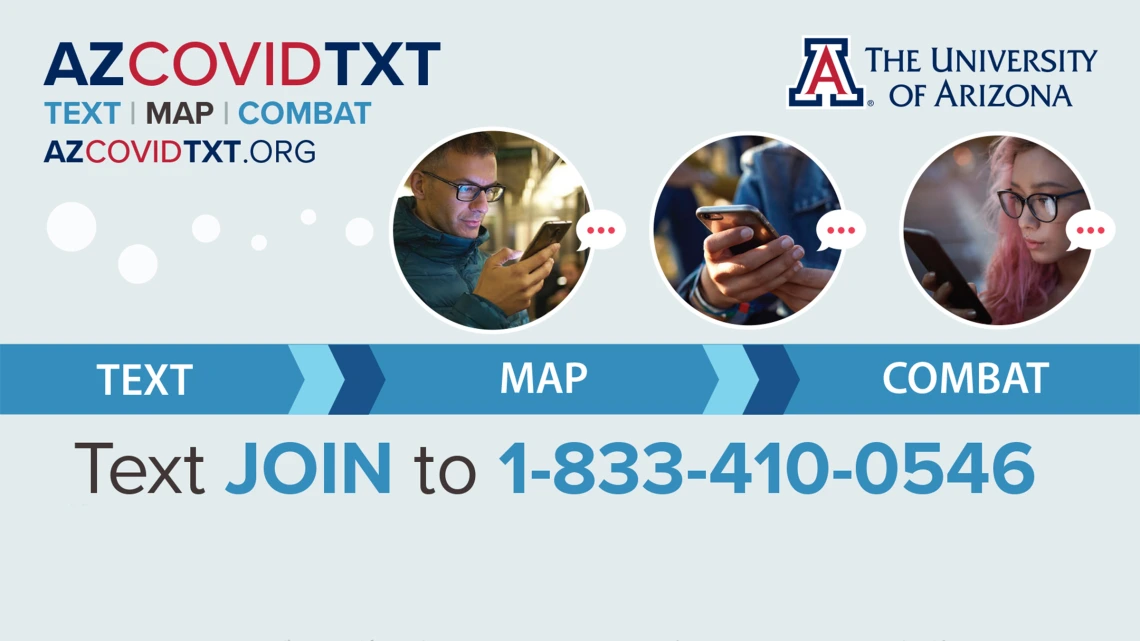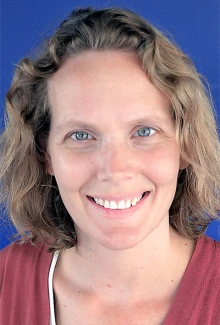New Two-Way Texting System Helps Researchers Track COVID-19
Accessible, easy-to-use tool helps provide real-time data about health, before people end up in hospitals or in need of testing.

The text-messaging system enables users to communicate about household health and/or symptoms.
A new two-way texting system developed by a team of researchers from the University of Arizona Health Sciences and the UArizona Data Science Institute will enable researchers to understand the true prevalance and spread of the virus that causes COVID-19, and send resources where they are most needed.

Kacey Ernst, PhD, MPH
The new system, called AZCOVIDTXT, is an easy way for people to report the health and wellness condition in their household on a weekly basis by participating in brief surveys via their mobile phones. This will allow users to connect with needed resources and provide vital pandemic information to a team of researchers led by Kacey Ernst, PhD, MPH, associate professor and infectious disease epidemiologist at the Mel and Enid Zuckerman College of Public Health.
The project team also includes Data Science Institute (Data7) Director Nirav Merchant, MS; Tracy Crane, PhD, RDN, assistant professor, Biobehavioral Health Sciences Division, UArizona College of Nursing, and co-director of the Behavioral Measurement and Interventions Shared Resource at the UArizona Cancer Center; Sriram Iyengar, PhD, associate professor of internal medicine and director of clinical outcomes research analytics, UArizona College of Medicine – Phoenix; and Tejal M. Parikh, MD, associate professor, Family and Community Medicine, and assistant dean, UArizona College of Medicine – Tucson. Dr. Parikh is coordinating medical students who wanted to participate in the project.
The AZCOVIDTXT project idea originated in a late-March query from Dr. Iyengar on how UArizona colleagues could help provide localized data on COVID-19 in Arizona through self-reporting and real-time analysis, said Merchant.
“Everything you’re seeing right now, in terms of keeping track of how the disease is progressing, is at a very coarse grain. It’s county level at best. It’s usually data summarized at the state level. And all of this is coming from hospitals or clinics at the end of the spectrum, after people are already gravely ill. They are not people telling you, ‘Hey, I don’t feel well,’ or ‘I have a fever and something else,’” he said.

Nirav Merchant, MS
“We don’t really know the full scope of the outbreak, and this will allow a two-way exchange with the public,” Dr. Ernst added. “This will allow us to see patterns as people report what they’re experiencing. It will also help content experts craft messages and send them to key vulnerable populations. That includes messages about mental health and how to keep ourselves resilient in this time.”
The tool allows researchers to reach a large group of people quickly, and also to provide information that can help dispel myths or prevent scams, Dr. Crane said.
A promotional campaign is encouraging Arizonans to join the crowd-sourcing project. Phase one targets Pima County and aims to enroll as many as 100,000 households, phase two targets 500,000 households and phase three takes the project statewide to enroll 1 million or more participants.
Government agency leaders on the state and local levels have expressed their support for the project, including Bob England, MD, MPH, director of the Pima County Health Department, and Francisco Garcia, MD, MPH, the department’s chief medical officer and Pima County deputy administrator.

Tracy Crane, PhD, RDN
“With many people isolated or sheltering in place, Arizonans now have more limited access to timely care and everyday resources such as food and medicine, and they may be uncertain how their community is being impacted by the pandemic,” said Michael D. Dake, MD, senior vice president for Health Sciences. “This innovative texting system, which protects anonymity by de-identifying and aggregating information provided by users, builds upon multiple ongoing UArizona Health Sciences pandemic response efforts, including the creation and distribution of COVID-19 specimen collection kits around the state so more people can be tested for the virus.”
Dr. Ernst emphasized that the AZCOVIDTXT project allows participants to anonymously enroll and provide weekly information on the wellness of themselves and others in their households during the pandemic. It does not collect personally identifiable information and does not attempt to locate or track participants.
“In addition to health questions, users will be asked about access to food, medicine, sanitary and other essential supplies, and about stress and anxiety levels,” Dr. Ernst added. Follow-up messages may refer users to an area food bank, counseling or other services.
The information, gathered by ZIP code, will be protected through the REDCap surveys and clinical databases managed by the UArizona Center for Biomedical Informatics and Biostatistics.
“The University of Arizona continues to innovate in helping Pima County and the state address the COVID-19 crisis,” said Elizabeth “Betsy” Cantwell, PhD, UArizona’s senior vice president for research and innovation. “The AZCOVIDTXT tool goes beyond where people are sick, to where people are suffering from the unavailability of food, access to medicines or medical treatment, and are dealing with other life challenges. By participating, we can together assist authorities in channeling support where it is most needed, and truly understand the impacts of this crisis on our communities.”

